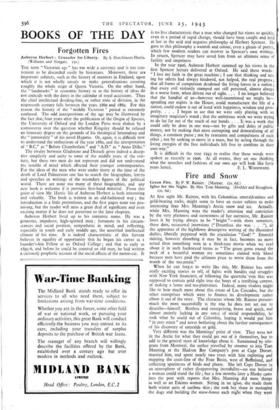BOOKS OF THE DAY
Forgotten Fires
Auberon Herbert : Crusader for Liberty. By S. Hutchinson Harris. (Williams and Norgate. iss.)
THE term " Victorian age " has too wide a currency and is too con- venient to be discarded easily by historians. Moreover, there are important subjects, such as the history of manners in England, upon which it is not wholly unsafe to make generalisations covering roughly the whole reign of Queen Victoria. On the other hand, the "landmarks " in economic history or in the history of ideas do not coincide with the dates in the calendar of royal accessions. Thus the chief intellectual dividing-line, or rather zone of division, in the nineteenth century falls between the years t86o and 1880. For this reason the history of the " middle Victorian " period is extremely confused. The odd juxtapositions of the age may be illustrated by the fact that, four years after the publication of the Origin of Species, the University of Oxford and the London Press were shaken by a controversy over the question whether Kingsley should be refused an honorary degree on the grounds of his theological heterodoxy and the " immorality " of his novel Hypatia. Or, again, it is difficult now to understand the enthusiasm of the year i88o, and the interpretation of " B.C." as " Before Chamberlain " and " A.D." as " Anno Dilke."
The rivalry between Gladstone and Disraeli gives indeed a decep- tive simplicity and unity to some of the middle years of the cen- tury, but these two men do not represent and did not understand the trouble of mind which affected their younger contemporaries. For the ideas of the men who were under thirty at the time of the death of Lord Palmerston one has to search the biographies, letters and speeches or writings of the secondary figures of the political world. There are none too many of these biographies, and any new book is welcome if it provides first-hand material. From this point of view Mr. Harris life of Auberon Herbert is both interesting and valuable. The book is written in an old-fashioned way ; the introduction is a little pretentious, and the first pages none too pro- mising, but the reader will miss a great deal of significant and even exciting matter if he does not persevere to the later chapters.
Auberon Herbert lived up to his 'romantic name. He was a generous, impulsive, high-spirited man ; fortunate in his circum- stances and social position, sympathetic in mind, and reflecting, especially in youth and early middle age, the unsettled intellectual climate of his time. It is indeed characteristic of this fervent believer in equality of opportunity that he began his career as a founder's-kin Fellow at an Oxford College ; and that as early as 1395-6, and before he could be counted an old man, he had written a curiously prophetic account of the social effects of the motor-car. It
is no less characteristic that a man who changed his views so quickly, even in a period of rapid change, should have been caught and held at last in the arid and negative philosophy of Herbert Spencer. He gave to this philosophy a warmth and colour, even a gleam of poetry, which few modern readers can recover in Spencer's own writings. In return, Spencer may have saved him. from an ultimate sense of futility and emptiness.
In the year 1906, Auberon Herbert summed up his views in the first Spencer lecture delivered at Oxford. He said these words: " I lost my faith in the great machine ; I saw that thinking and act- ing for others had always hindered, not helped, the real progress ; that all forms of compulsion deadened the living forces in a nation ; that every evil violently stamped out still persisted, almost always in a worse form, when driven out of sight. ... I no longer believed that the handful of us—however well-intentioned we might be— spending our nights :n the House, could manufacture the life of a nation; could endow it out of hand with happiness, wisdom and pros- perity. . . . I began to see that we were only playing with an imaginary magician's wand ; that the ambitious work we were trying to do lay far out of the reach of our hands. . . . It was a work that could only be done in one way—not by gifts and doles of public money, not by making that most corrupting and demoralising of all things, a common purse ; not by restraints and compulsions of each other ; not by seeking to move in a mass, but by acting through the living energies of the free individuals left free to combine in their own way."
It is difficult in the year 1943 to realise that these words were spoken as recently as 1906. At all events, they set one thinking what the speeches and fashions of our own age will look like forty






























 Previous page
Previous page